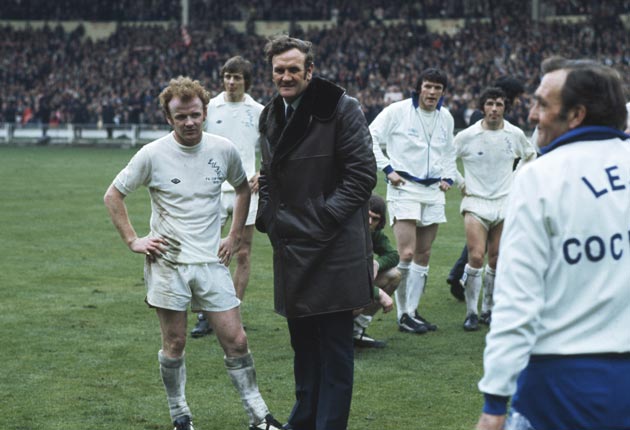Brian Viner: Revie was the original master at convincing himself the world was against his team
The Last Word

Arsène Wenger doesn't need anyone to feel aggrieved on his behalf.
He could, after all, be stranded for years on a desert island and still manage to generate enough grievances to sustain him until a rescue boat shimmered into view, and even then he'd fully expect to find it crewed by the members of Uefa's disciplinary committee, with Massimo Busacca at the helm. All the same, I cannot help but feel sympathy for the Arsenal manager, whose team has, within the space of a few days, been on the wrong end of three lamentable refereeing decisions – one by Busacca in the Nou Camp, and two last Saturday by Anthony Taylor – that might yet undermine the Gunners' entire season.
Taylor, with the help of his assistants, disallowed a perfectly legitimate Andrei Arshavin goal, and denied Arshavin a clear penalty, in the 0-0 Premier League draw against Sunderland. Busacca, preposterously, sent off Robin van Persie in the Champions League tie against Barcelona, a decision that Wenger was right to call an affront not only to those who love Arsenal, but also to those who love football.
On the other hand, the feelings of Arsenal-lovers and football-lovers might have diverged rather dramatically had Wenger's players contrived to find a way into the Champions League quarter-finals at Barça's expense on Tuesday. A set of statistics that shows one team registering 19 shots at goal, and the other precisely none, seems more appropriate to a match between a side of sixth-formers and an under-sevens XI than an encounter between the leaders of La Liga and the second-placed team in England. Wenger can't have it both ways. If Van Persie's red card was a blow to football as well as to Arsenal, the home team's win was a victory for football as well as for Barcelona, and if you slipped a truth serum into Wenger's Ovaltine, he'd say so too.
Meanwhile, with the refereeing fraternity currently less popular than Lord Voldemort and the Dementors with the managers of both Arsenal and Manchester United, the Football Association must have considered putting teatime's FA Cup quarter-final between the two old adversaries in the hands of the Dalai Lama.
And yet nothing energises Wenger and Sir Alex Ferguson more than the feeling that the rest of football is conspiring against them, in which respect they both embody the spirit of a man who first took up the managerial cudgel 50 years ago next week. On Wednesday it will be half a century since Don Revie was named Leeds United's seventh post-war manager, and a new book, Revie: Revered and Reviled, written by the Yorkshire Post's Richard Sutcliffe as a direct response to Colm Meaney's joyless portrayal of Revie in the film The Damned United, attempts to rehabilitate the reputation of a man long since dismissed as a footballing anti-hero by folk who don't support Leeds.
Of course, there's not much about Arsenal's brand of football under Wenger, or Manchester United's under Fergie, that evokes Leeds United in the Revie years, but it's hard to think of three managers who have thrived quite so much on the perception that their defining fixture is them, and their team, against the world.
Wartime Warrior puts racing deeds in true perspective
With the Cheltenham Festival almost upon us, it seems worth recalling a time when victory in the Gold Cup was not the greatest measure of a horse. Earlier this week the Military History Channel screened Galloper Jack, Brough Scott's elegantly poignant tribute to his dashing grandfather, Jack Seeley, the Secretary of State for War between 1912 and 1914, who, forced to resign from the Cabinet over a bit of bother in Ireland, promptly set off for the Western Front, where he was given the command of the Canadian Cavalry.
With him for the next four years was Warrior, a bay thoroughbred who carried Seeley through Ypres, Passchendaele and the Somme. Together, in March 1918, they led one of history's last great cavalry charges, on Moreuil Wood near Amiens. In Scott's book Of Horses and Heroes, he writes that Seeley's men prevailed, despite appalling losses, because enough of them "had been able to brave the bullets and dismount to clear the Germans, with – and this should cure some of us sportswriters of ever misusing the metaphor again – 'bayonets fixed'".
Amen to that. Indeed, we should probably think twice even before using the word "heroic" at Cheltenham next week. Warrior, incidentally, lived to a great age, but where the First World War failed to finish him off, the Second World War succeeded. Retired to the Isle of Wight, he was put down in 1941, aged 33, because the island couldn't spare the oats to feed him.
For taking the mickey Britain wins gold
On Monday evening, on BBC 4, there begins a six-part spoof documentary called Twenty Twelve, parodying so exquisitely the preparations for next year's Olympic Games that sometimes you don't know whether to laugh or shudder. The head of PR, for example, has never heard of Matthew Pinsent. And Bruce Forsyth, Trevor McDonald and Gok Wan are considered leading contenders to be Olympic torch-bearers. See what I mean? It's wincingly plausible. Yet would anyone but the British send themselves up in this way, even to the extent of getting the grand panjandrum himself, Lord Coe, to play along? I don't think so. And three cheers for it.
Join our commenting forum
Join thought-provoking conversations, follow other Independent readers and see their replies
Comments
Bookmark popover
Removed from bookmarks